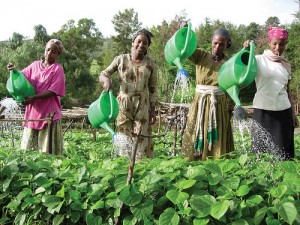MOTIVATION
Ethiopia has achieved significant reductions in poverty in recent years. While nearly 46 percent of the population resided below the poverty line in 1995, this figure dropped to nearly 30 percent by 2011, according to the World Bank. This achievement can be attributed, in part, to policies that effectively targeted the rural poor.
Central to the development of effective policy responses is sound research. IFPRI initiated its research program in Ethiopia in the 1980s, producing influential studies on famine and food insecurity. These research results provided much-needed insight into the causes of and appropriate policy responses to drought-related food shortages in Ethiopia and beyond.
In 2004, IFPRI launched the Ethiopia Strategy Support Program—in partnership with the government of Ethiopia and regional partners—to cultivate country specific solutions. In Ethiopia, as in many countries, development strategies face design, implementation, and monitoring challenges. IFPRI’s in-country work is dedicated to reducing hunger and undernutrition throughout Ethiopia. This is accomplished by fostering the efforts of universities, government agencies, and nongovernmental organizations as they shape the country’s development priorities and strategies.
Through the years, with support from several donors including Irish Aid, USAID, Canada, and the UK department for International Development (DFID), the Ethiopia Strategy Support Program has promoted sustainable development and poverty reduction in Ethiopia through policy-oriented research, capacity building, strengthening of institutions, and an open dialogue on economic and agricultural policy. Key local partners include the Ethiopian Development Research Institute, the Central Statistical Agency of Ethiopia, the Ministry of Agriculture, the Agricultural Transformation Agency, and the Ethiopian Economics Association.
OUTCOMES
- An external impact evaluation has revealed the following outcomes of the Ethiopia Strategy Support Program:
- The program has strengthened the capacity of five core national institutions in their role as local partners: Ethiopian Development Research Institute, the Ministry of Agriculture and Rural Development, the Ministry of Finance and Economic Development, the Central Statistical Agency, and the Ethiopian Institute for Agricultural Research.
- There is widespread acknowledgement within the donor community in Ethiopia that IFPRI’s research contributed substantially both to the establishment of donor priorities and efforts to support government policies consistent with those priorities.
- The Ethiopian computable general equilibrium model, developed by IFPRI together with local partners, has been used in national policy formation, such as the exchange rate devaluation in 2010, in which IFPRI research indicated that devaluation of the Ethiopian birr was the best way to deal with excess demand for foreign exchange. The government took this input into consideration and the birr was allowed to depreciate significantly.
- The Productive Safety Net Programme: The Productive Safety Net Programme is the second-largest social safety net program in Africa south of the Sahara, targeting transfers to poor households through public works and direct support. IFPRI played a principal role in monitoring and evaluating the program’s effectiveness in addressing the formidable food security challenges faced by Ethiopia’s poorest citizens. IFPRI’s work has been useful in measuring program outcomes and impacts, keeping stakeholders well informed about the program’s operations, and contributing to in-depth donor coordination, which has fostered an unusually open and constructive environment among donors. These contributions led directly to strong support for IFPRI to design and execute sophisticated monitoring and evaluation systems for other major funded programs such as the Agricultural Growth Program.
- Ethiopia Commodity Exchange: IFPRI’s research and technical support on agricultural commodity markets led to the launch of the Ethiopia Commodity Exchange. The Exchange, by generating market information for farmers on important crops such as coffee, sesame, haricot beans, maize, and wheat, is bringing transparency and integrity to the pricing system, which increases smallholder farmers’ incomes by allowing them to sell at higher prices.
- Agricultural Transformation Agency: Currently, IFPRI is providing technical research, capacity building, and policy communications support to Ethiopia’s Agricultural Transformation Agency. This new government agency, a catalyst for sustainable change in the sector, is developing a national agenda to achieve both growth and food security by addressing systemic bottlenecks.
- Since 2004, the government has relied heavily on IFPRI’s analysis in formulating and implementing the Agricultural Development Led Industrialization Strategy. In addition, IFPRI worked with the Central Statistical Agency to provide analysis to the Agricultural Growth Program, a major government project.
- IFPRI has built capacity at partner institutions such as the Central Statistical Agency, the Ethiopian Development Research Institute, and national universities.
- The Ethiopia Strategy Support Program has trained more than 800 Ethiopian participants in areas such as computer economic models and mapping —a contribution that has been applied in a variety of research contexts, from the Comprehensive Africa Agriculture Development Programme goals to climate change scenarios in Ethiopia.
- Since 2009, 40 working papers and research notes, jointly authored with the Ethiopian Development Research Institute, have been published in an effort to improve access to relevant research results at the country level. These analyses have provided timely inputs to the government’s formulation of exchange rate and wheat price stabilization policies and have supported the Comprehensive Africa Agriculture Development Programme’s assessment of the implications of agricultural investments on growth and poverty.
- Together with local partners, IFPRI has published several atlases that have been met with keen interest from stakeholders. In particular, the Atlas of the Ethiopian Rural Economy (2006), the Population and Housing Census Atlas of Ethiopia 2007 (2011), and the Atlas of Agricultural Statistics 2006/07–2010/11 (2011) are in high demand for decision making and spurring policy dialogue.
For additional information, please go to the ESSP outcome notes.



